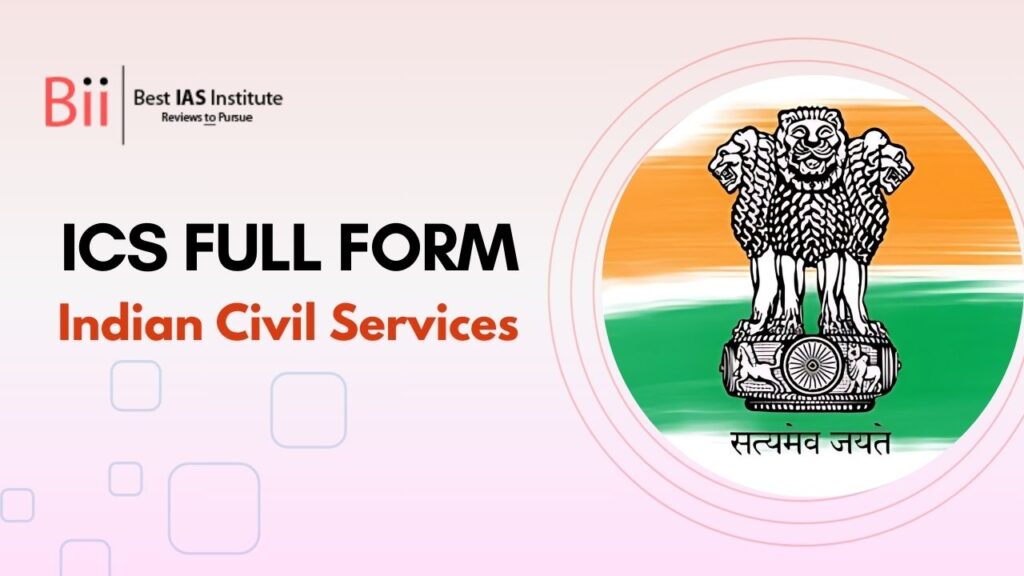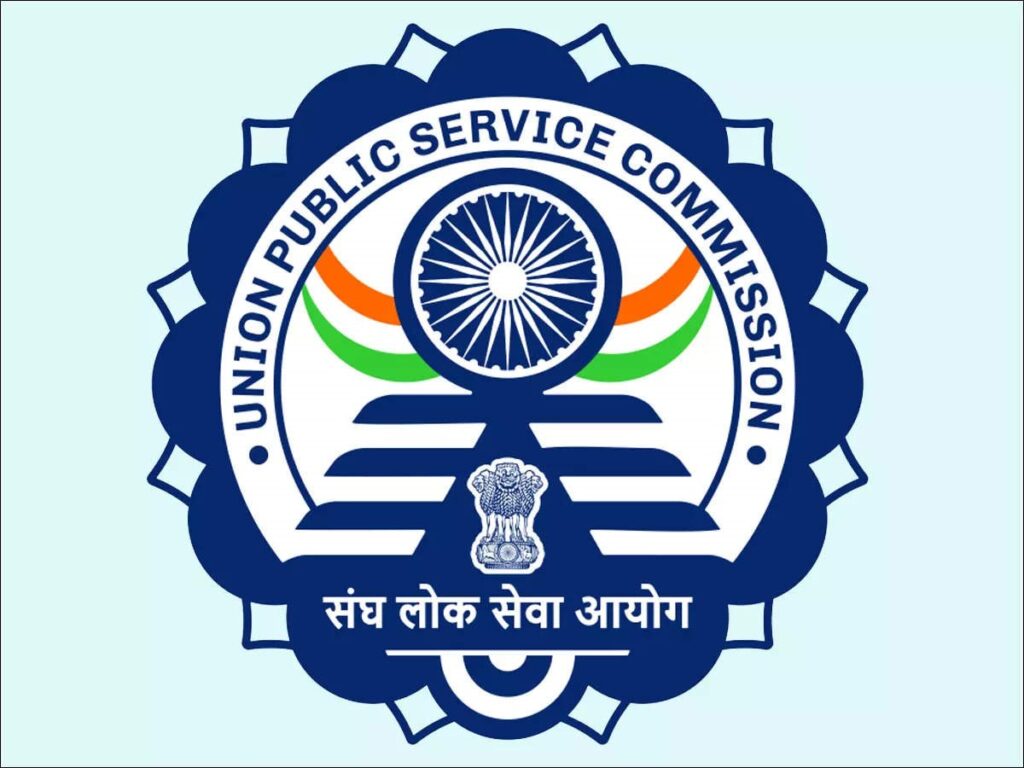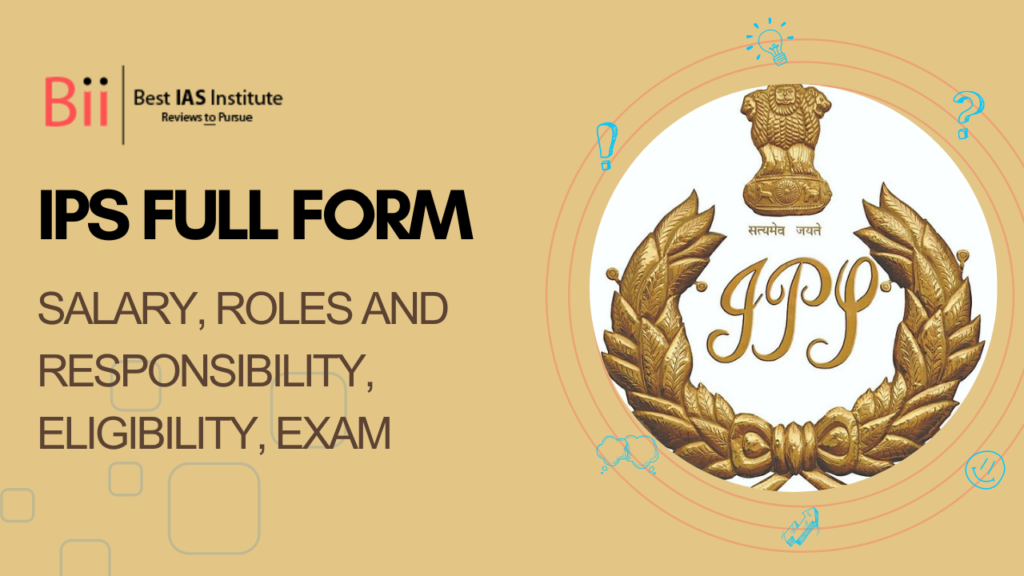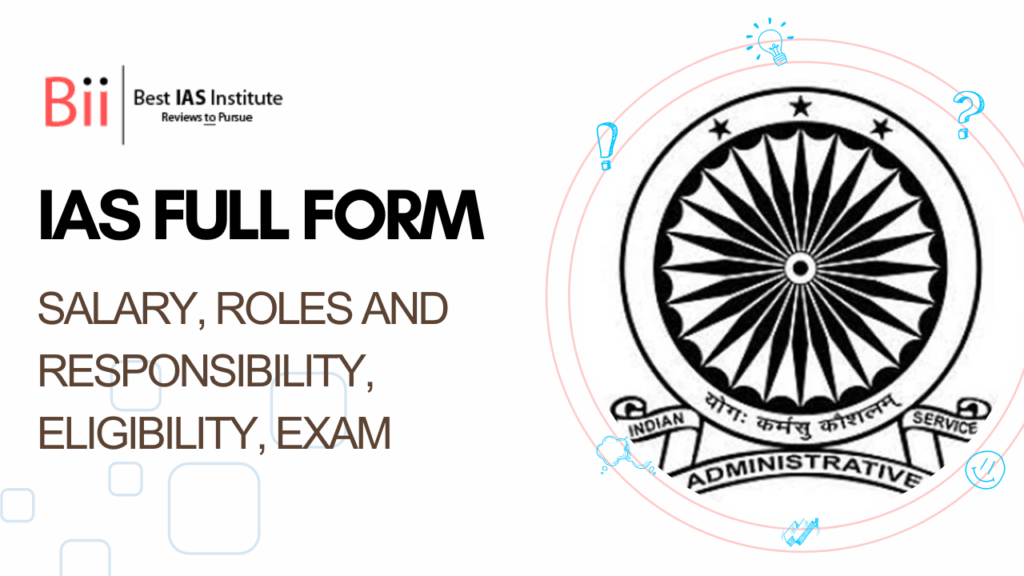
What is ICS Full Form?
ICS full form represents “Indian Civil Service”. Under British rule, colonial India had a high level of administrative and bureaucratic functions. The ICS was responsible for administration and administration in British India. After India gained independence, the ICS was reorganized into the Indian Administration (IAS) to continue its administrative functions in the newly formed democracy.
| ICS Full Form | |
| ICS Full Form | Indian Civil Service |
| Established Year | 1858 |
| ICS Full Form in Hindi | भारतीय लोक सेवा |
| Roles and Responsibilities | Managing civil administration and governance policies |
Meaning of Indian Civil Service (ICS)
The Indian Civil Service is a government ranking body that runs the country and the tasks include administration, policing, and decision-making. Civilians working in these fields are selected through a rigorous exam called the Civil Service Examination. After the elections, they work in various ministries to ensure the smooth running of the country and these activities include implementing government policy, providing public services, and maintaining law and order. Indian public administration plays an important role in the development and governance formation of the country and by making it essential for the functioning of the Indian democratic system.
History of Indian Civil Service (ICS)
The Indian Civil Service (ICS) was introduced by British colonial rule during the British Raj in India and the introduction of the ICS was due to Lord Warren Hastings, who was the Governor General of India from 1773 to 1785. It was established to create an administrative body that could effectively manage and control the vast territories of British India After India gained independence it evolved into the Indian Administrative Service (IAS).
Roles of Indian Civil Service (ICS)
The following roles are given below for Indian Civil Services ( ICS):
- District Collector: The main role of the ICS officers is the District Collector and they are in charge of the overall administration of a district, including fundraising, law and order maintenance and development activities.
- Revenue: ICS employees were essential in handling collection and collected land revenue, maintained land records, and ensured that land maintenance was done properly and efficiently.
- Judicial functions: ICS officers were often judges and judges and they presided over both civil and criminal courts and played an important role in the administration of justice.
- Maintaining Law and Order: By Maintaining law and order in their province was an important responsibility and the officials worked closely with police and other law enforcement agencies to ensure peace and security.
How to Become an ICS Officer?
The Indian Civil Service (ICS) has been non-existent since its dissolution in 1947 when India gained independence from British rule and it was replaced by the Indian Administration Service (IAS), which is the central administrative agency of the Government of India.
The candidates need to follow a few steps for becoming an Indian Civil Services ( ICS) including:
- Eligibility: The first step is to check if you meet the relevant criteria for the IAS exam and the minimum academic qualification required is a bachelor’s degree from a recognized university and aspirants must also be between 21 and 32 years of age and must be Indian citizens.
- Exam Pattern: Aspirants should understand the exam pattern and syllabus of IAS exam and it consists of three stages: Preliminary Test, Main Test, and Personality Test/Interview.
- Preparation: Candidates should make a study plan and follow it strictly and the study materials such as textbooks, research books and newspapers should be collected and they also have to prepare previous year question papers and take a mock test to check their preparation.
- Time management: Time management is important to clear the IAS exam and they need to learn how to manage their time wisely, especially in the main exam, where they have to write long answers in a short period of time.
Pattern of Indian Civil Service (ICS) Exam
| Indian Civil Service (ICS) Exam Pattern | ||||
| Stage of Examination | Name of the Paper | Type of Paper | Duration | Marks |
| Stage 1: Preliminary Exam | Paper-I: General Studies | Objective Type | 2 hours | 200 |
| Paper-II: Civil Services Aptitude Test (CSAT) | Objective Type | 2 hours | 200 | |
| Stage 2: Mains Exam | Paper-I: Essay | Descriptive | 3 hours | 250 |
| Paper-II: General Studies-I | Descriptive | 3 hours | 250 | |
| Paper-III: General Studies-II | Descriptive | 3 hours | 250 | |
| Paper-IV: General Studies-III | Descriptive | 3 hours | 250 | |
| Paper-V: General Studies-IV | Descriptive | 3 hours | 250 | |
| Paper-VI: Optional Subject – Paper 1 | Descriptive | 3 hours | 250 | |
| Paper-VII: Optional Subject – Paper 2 | Descriptive | 3 hours | 250 | |
| Personality Test (Interview) | 275 | |||
Difference Between ICS and IAS
The Indian Civil Service (ICS) and the Indian Administrative Service (IAS) are prominent government agencies in India, but there are significant differences between them and IAS is a specialized branch of ICS that focuses mainly on operational activities at regional, state and central levels. On the other hand, ICS covers a wide range of labor, police, street, and revenue services and the IAS officers primarily perform administrative tasks such as policy implementation, delivery of public services, etc. Indian Civil Services officers perform government functions such as law enforcement, diplomacy and fundraising Notwithstanding these differences, both play an important role in shaping India’s governance and development.
Full Form of ICS in Different Fields
| Field | Full Form |
| ICS full form in Education | Indian Civil Services |
| ICS full form in Telecommunications | Integrated Circuit System |
| ICS full form in Medicine | Intraoperative Chemotherapy System |
| ICS full form in Finance | Internal Control System |
| ICS full form in Aviation | International Card Services |
Conclusion
ICS full from is Indian Civil Service, It is the backbone of Indian governance and in public offices are filled through rigorous selection processes, making the state more efficient and by decision-making to public service delivery and legislation, ICS officers play a vital role in shaping the country’s development trajectory and ICS dedication and expertise contribute immensely to maintaining law and order, implementing government policies and promoting socio-economic development and custodians of India’s democratic ideals, the Indian Civil Service stands as a testament to that that the country is committed to effective governance and efficiency in the public service.



